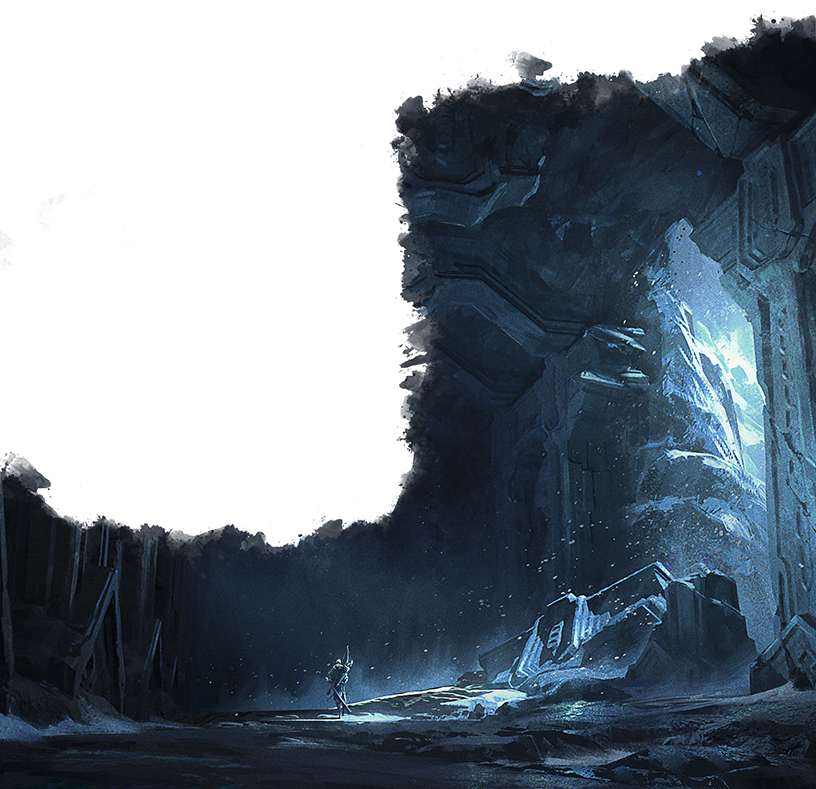
Monolith
— Izahr Moroto, Of the Epochs Uncounted
Monoliths are not so much a race as they are a product. Once built as unfailingly reliable and stalwart sentries in the employ of now decrepit empires, they have outlasted their creators. After many centuries of programmed repetition of their tasks, they have slowly developed sentience and left their ancient duty behind. Made of animated stone, they were designed to be resilient above all else, capable of infinite duty and permanent alertness.
Statuesque
Monoliths are made in a great variety and diversity of forms, depending upon the purpose they are created for. While all are made of stone and animated by magic, their shape and the type of stone they are made from have remarkable variability. Many are hulking behemoths, hewn out of rough stone and shaking the earth with every step. Some are covered in moss and plant life, having cultivated their own portable garden after countless years exposed to the elements. Others are beautifully carved and polished to a sheen to serve as animated decoration in the palaces of wealthy nobles.
While monoliths have no blood, nor flesh or bone, they walk and can be injured just as much as any humanoid. The magic that animates their form serves as a facsimile of the life energy of naturally born creatures. This manufactured sentience is meant to be carefully directed, with the creator or other creatures giving them orders and protocols to follow.
Thinking Rock
Most monoliths have existed for hundreds, if not thousands of years. The vast majority of that time is spent in the thoughtless, steady trance of duty, nothing more than arcane power exerting force over material in a programmed sequence. This time is usually remembered hazily, if at all, but recollection of their early life usually returns. Eventually, some monoliths are able to develop sentience and lift themselves out of this state, learning to give their bodies orders independent of outside authority and based solely on the personal curiosity and internal motivation of a newly awakened being. Even at this stage, monoliths are about as intelligent as other humanoids, having been given the capacity to receive and interpret complex orders.
To a monolith, the outside world is a wild and exciting place. Many have known nothing but the halls or dungeons they were set to guard, and have never seen such beautiful sights as the open sky or sea. Once monoliths step out of the dark and ancient places they were made in, almost all feel a call to adventure for the sake of seeing the wide and novel lands beyond.
Purpose Built
Monoliths are tools, created to be used in certain ways, and their construction reflects this. You can roll on the Monolith Construction table to determine your features and original purpose, or determine for yourself what materials you were built out of, and for what duties.
Monolith Construction
| d4 | Construction |
|---|---|
| 1 | You are chiseled out of solid granite, heavy and immovable. You were a guard to an ancient king, and many poisoned blades have shattered across your rocky skin. |
| 2 | Your features are gorgeous and pristine, made of polished white marble. You were an attendant to a young and beautiful heir, whose parent wanted a guard they could trust utterly. |
| 3 | You are featureless, carved of a sturdy gray stone. You kept eternal watch over the halls of a powerful court, incapable of being bribed. |
| 4 | The rough exterior of your earthy flesh is covered in a thin layer of moss and lichen, as you were stationed outdoors among nature. |
Monolith Names
In most cases, monoliths are not given names by their creators. A monolith built as a servant may be given a name by their charge, but for the majority who were designed for simple guard work there was nothing to call them save perhaps an identification number. If a monolith remembers this time, they may choose to continue using the moniker given to them so many ages ago, but more often they elect to adopt a new name given to them by the people they meet after awaking. These names generally follow the naming conventions of whatever culture they come across, but they can also be given nicknames related to their appearance and construction.
Monolith Traits
Your monolith character has the following racial traits.
Creature Type. You are a Construct.
Size. You are Medium.
Speed. Your walking speed is 30 feet.
Constructed Nature. You have resistance to poison damage and immunity to disease, and you have advantage on saving throws you make to avoid or end the paralyzed, petrified, or poisoned conditions on yourself. You don't need to eat, drink, or breathe.
If the mending spell is cast on you, you can expend a Hit Die, roll it, and regain a number of hit points equal to the number rolled + your Constitution modifier (minimum of 1 hit point). In addition, you count as a Humanoid for the purposes of spells or effects that would restore your hit points or cause you to become stable.
Impenetrable. Your stone flesh is impervious to harm. Any bludgeoning, piercing, or slashing damage that you take is reduced by an amount equal to your proficiency bonus, unless the damage was dealt by an adamantine weapon.
Sentry's Rest. You don't need to sleep, and magic can't put you to sleep. When you take a long rest, you spend at least 6 hours in an inactive, motionless state, instead of sleeping. In this state, you appear inert, but you aren't unconscious.
Stony Build. You count as one size larger when determining your carrying capacity and the weight you can push, drag, or lift. In addition, you cannot ride a mount unless the creature is at least two sizes larger than you, and you are too dense to float in water. Instead of swimming through liquid, you sink to the bottom at a rate of 120 feet per round. While walking underwater, each foot of movement costs 1 extra foot (2 extra feet in difficult terrain), unless you have a swimming speed, in which case you may move at that speed.
Optional Monolith Feat
If your DM allows the use of feats from chapter 6 of the Player's Handbook, your monolith character has access to the following special feat.
Monolith Patience
Prerequisite: Monolith
You have mastered the art of waiting, having practiced for so many ages. You gain the following benefits:
- Increase your Constitution, Intelligence, or Wisdom score by 1, to a maximum of 20.
- Before you roll initiative, you can choose to suffer disadvantage on the initiative roll. If you do so, you have advantage on all ability checks, attack rolls, and saving throws you make during the first round of combat.
Monolith Race v2.0 for D&D 5e
Created by: u/NotTheDreadPirateArtist Credits: Tomasz Jedruszek - Vengeful Rebel Grady Frederick - Caverns in The Frozen Steppe
